|
|
|
Sort Order |
|
|
|
Items / Page
|
|
|
|
|
|
|
| Srl | Item |
| 1 |
ID:
185290
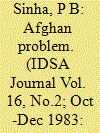

|
|
|
| 2 |
ID:
123649
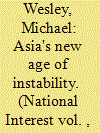

|
|
|
| 3 |
ID:
113905
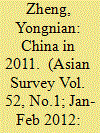

|
|
|
|
|
| Publication |
2012.
|
| Summary/Abstract |
This paper identifies major trends in China in 2011 and analyzes their implications. The past year has witnessed a continuous rise of anger among social groups, as demonstrated in various forms of social protests. Chinese intellectuals are becoming increasingly politically conscious and calling for political reform. However, the leadership is trapped in the politics of power succession; uncertainty is widespread.
|
|
|
|
|
|
|
|
|
|
|
|
|
|
|
|
| 4 |
ID:
098792
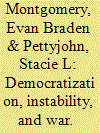

|
|
|
|
|
| Publication |
2010.
|
| Summary/Abstract |
In 2006 Israel resumed military operations in the Gaza Strip and conducted a war in Lebanon following attacks by Hamas and Hezbollah, respectively. Due to the elections that had recently taken place in the Palestinian territories and Lebanon, these events seem to support the argument that democratizing nations are particularly war-prone. Yet the dynamics this perspective identifies as dangerous were largely absent. To address this puzzle, this paper offers three arguments. First, democratization enhanced the power of groups openly hostile to Israel, increasing Israel's perception of threat. Second, democratization was threatening because it occurred within highly divided societies governed by weak state institutions that allowed radical groups to attain political power. Finally, Israel's response to the increased threat posed by these groups was ultimately counterproductive because it further eroded the capacity of the Palestinian and Lebanese governments, heightened polarization within both societies, and therefore exacerbated the same conditions that made democratization threatening to begin with.
|
|
|
|
|
|
|
|
|
|
|
|
|
|
|
|
| 5 |
ID:
165216
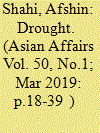

|
|
|
|
|
| Summary/Abstract |
Approximately 97% of the country is experiencing drought conditions. Due to gross water mismanagement and its damaging impact on the country, Iran faces the worst situation in water resources of any industrialized nation. Tens of thousands of villages have been deserted and most of the major urban centers have passed their limits to absorb new rural migrants. Some officials predict that in less than 25 years, 50 million Iranians would be displaced from their current homes because of the pressing ecological conditions. This is happening at the time that the gap between the grassroots and the state has widened and there is increasing dissatisfaction with governance plagued by corruption, nepotism, economic mismanagement, unaccountability and a foreign policy which has produced various regional and trans-regional adversaries. This paper evaluates the pressing ecological challenges in Iran and by conceptualizing political resilience it critically evaluates whether the Islamic Republic is prepared to face the devastating ecological crisis and its socio-economic consequences.
|
|
|
|
|
|
|
|
|
|
|
|
|
|
|
|
| 6 |
ID:
184060
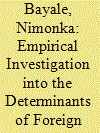

|
|
|
|
|
| Summary/Abstract |
This paper introduces model uncertainty into the empirical study on the determinants of foreign aid at the regional level. This is done by adopting a panel Bayesian model averaging approach applied on the data of 10 Sahel countries spanning from 1985 to 2017. Our results suggest that, among the regressors considered, those reflecting trade stakes including arm imports, institutional conditions and socioeconomic prospects tend to receive high posterior inclusion probabilities. These findings are robust to changes in the model specification and sample composition and are not meaningfully affected by the linear panel data model applied. The results highlight three concerns that justify aid flows towards Sahel countries: (i) interest of donors (self-interest), (ii) recipient economic needs and (iii) security purposes. The paper recommends Sahel countries to strengthen international cooperation for security and peace in compliance with the 13th goal of the Agenda 2063 of the African Union.
|
|
|
|
|
|
|
|
|
|
|
|
|
|
|
|
| 7 |
ID:
180392
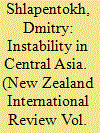

|
|
|
|
|
| Summary/Abstract |
Tajikistan, one of the poorest former Soviet republics, was wracked by a brutal civil war in 1990. By some estimates, more than 100,000 people were killed. After the end of this bloody conflict, the republic was still unstable, especially with the great influence of Islamism. The prison revolt last year indicates that an Islamist uprising could well spread. This has forced Emomali Rakhmon, the president, to think about his personal security. In the event of a rebel victory, he would have very few countries where he could take refuge. Russia is among them.
|
|
|
|
|
|
|
|
|
|
|
|
|
|
|
|
| 8 |
ID:
128933
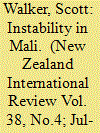

|
|
|
| 9 |
ID:
190763
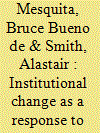

|
|
|
|
|
| Summary/Abstract |
Leaders shift political institutions to ameliorate threats to their tenure. The masses might rebel to replace the leader and change institutions. Disloyalty by political insiders might result in a coup. Leaders liberalize when the masses present a greater threat and ‘autocratize’ to dissipate threats from elites. A two-step procedure tests these arguments: (1) The risks of revolution and coup are estimated as a function of leader health, experience, economic conditions and extant institutions. (2) These risks are used to predict institutional change in a heteroskedastic regression model. The magnitude and direction of institutional change depends upon whether the masses or elites pose the greater threat. When both risks are high, leaders must gamble as to which risk they believe is greatest. In such circumstances, institutions are highly volatile even as the aggregate direction of change becomes unclear.
|
|
|
|
|
|
|
|
|
|
|
|
|
|
|
|
| 10 |
ID:
099179
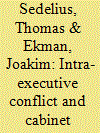

|
|
|
| 11 |
ID:
087075
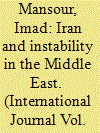

|
|
|
|
|
| Publication |
2008.
|
| Summary/Abstract |
In the Middle East today, Iran is trying to upgrade its status to a dominant power by demonstrating an ability to penetrate and influence various regional theatres. Meanwhile, despite being the sole global power with considerable military presence in the region, America's strategic initiatives in the Middle East are frustrated by Iran's behaviour.
|
|
|
|
|
|
|
|
|
|
|
|
|
|
|
|
| 12 |
ID:
131093
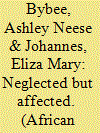

|
|
|
|
|
| Publication |
2014.
|
| Summary/Abstract |
The 'resource curse' is the paradoxical theory frequently used to explain how a seemingly desirable asset, such as oil, can actually pervert an economy, erode governance, perpetuate conflict, and ruin local communities to the extent that it becomes a curse. New oil discoveries in western Ghana and western Uganda have raised concerns for the democratic prospects and future stability of these countries and their surrounding regions. Based on field interviews in these oil-producing regions, this report summarises how local communities have been affected thus far and their concerns for the future. The authors assess the extent to which each country is vulnerable to oil-induced instability, and identify groups or communities that would be most likely to perpetuate it. Lastly, it provides some assessment of the future trajectory of each country.
|
|
|
|
|
|
|
|
|
|
|
|
|
|
|
|
| 13 |
ID:
084029
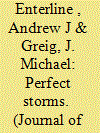

|
|
|
|
|
| Publication |
2008.
|
| Summary/Abstract |
What explains variation in domestic political instability in polities imposed by foreign powers? We formulate a framework grounded in four sources of political instability in imposed polities: (1) the initial conditions under which a polity is imposed, (2) policy choices made by the imposer, (3) the prevailing domestic conditions within states hosting the imposed polity, and (4) the international environment within which the host state is embedded. Employing a sample of ninety-four imposed polities during the period 1816-1994 to test expectations from the framework, we find, in part, that ethnoreligious heterogeneity coupled with democratic institutions, preimposition military defeat, colonial experience, dissimilarity of neighboring political institutions, hostility from neighboring states, and the presence of the imposing state each stimulate political instability. The analysis suggests a bleak prognosis for domestic peace in postinvasion Afghanistan and Iraq as the causal factors that militate against domestic stability are manifold and likely reinforcing.
|
|
|
|
|
|
|
|
|
|
|
|
|
|
|
|
| 14 |
ID:
082405
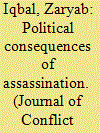

|
|
|
|
|
| Publication |
2008.
|
| Summary/Abstract |
The assassination of a political leader is among the highest-profile acts of political violence, and conventional wisdom holds that such events often have substantial political, social, and economic effects on states. We investigate the extent to which the assassination of a head of state affects political stability through an analysis of all assassinations of heads of state between 1952 and 1997. We examine the political consequences of assassination by assessing the levels of political unrest, instability, and civil war in states that experience the assassination of their head of state. Our findings support the existence of an interactive relationship among assassination, leadership succession, and political turmoil: in particular, we find that assassinations' effects on political instability are greatest in systems in which the process of leadership succession is informal and unregulated
|
|
|
|
|
|
|
|
|
|
|
|
|
|
|
|
| 15 |
ID:
142022
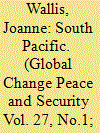

|
|
|
|
|
| Summary/Abstract |
The term ‘arc of instability’ was first used in 1999 to describe the security challenges facing the South Pacific. It subsequently came to dominate Australian political discourse, although its veracity was critiqued. This article considers how Australia's political discourse about the region has evolved since 1999 and what impact this has had on Australia's relationships in the region. It begins by outlining why the arc of instability characterization emerged and how it contributed to the securitization of the South Pacific, which justified Australia's policy of new interventionism in the region. It concludes by considering whether it might be time to recharacterize the region as an ‘arc of opportunity’. This recharacterization may shift the political discourse to focus on the South Pacific's potential and opportunities, desecuritize Australia's relationship with the region and diffuse concerns about continued Australian intervention by articulating a more cooperative approach.
|
|
|
|
|
|
|
|
|
|
|
|
|
|
|
|
| 16 |
ID:
183184
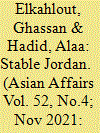

|
|
|
|
|
| Summary/Abstract |
The Hashemite Kingdom of Jordan has recently experienced large-scale unrest on a scale not witnessed for several years. The country, long viewed as a beacon of stability in a deeply fragile region, now faces a growing risk that it could be destabilised. This article addresses multiple pillars of stability and drivers of instability in Jordan, including the impact of the Syrian crisis, large-scale displacement, resource scarcity, and chronic political, economic, and social difficulties. Whilst the regime has endured crisis and remained stable, increasing pressures in the past few years have led analysts to predict the onset of violence or deepening instability in Jordan.
|
|
|
|
|
|
|
|
|
|
|
|
|
|
|
|
| 17 |
ID:
131094
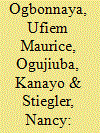

|
|
|
|
|
| Publication |
2014.
|
| Summary/Abstract |
Using the Boko Haram terrorist group in Nigeria as a point of departure, this paper examines the implications of the operations of terrorist groups on the security and stability of states in West Africa. It predominantly utilises secondary sources of data. Findings indicate that the membership and operations of this terrorist group are spreading across the sub-region. This spread is consequent upon Boko Haram's collaboration with other terrorist groups within West Africa and beyond. This constitutes threats to the security and stability of states in the sub-region. Thus, the paper recommends, among other things: a thorough understanding of the operational strategies of terrorist groups by states and those involved in security policymaking in the sub-region; and for agreements to be reached among Economic Community of West African States (ECOWAS) member states and their governments for collaboration in various areas in order to curtail transnational crime and terrorism, and reduce socio-economic inequality that generates aggressive behaviours among the less privileged.
|
|
|
|
|
|
|
|
|
|
|
|
|
|
|
|
| 18 |
ID:
087094
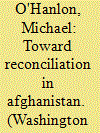

|
|
|
|
|
| Publication |
2009.
|
| Summary/Abstract |
How can we make sense of where the United States is in Afghanistan today? A poor country, wracked by 30 years of civil war, finds itself at the mercy of insurgents, terrorists, and narco-traffickers. NATO's economy-of-force operation there has attempted to help build a nation with very few resources. Yet, overall levels of violence remain relatively modest by comparison with other violent lands such as the Congo, Iraq, and even Mexico. Economic growth is significant and certain quality of life indicators are improving, though from a very low base.
|
|
|
|
|
|
|
|
|
|
|
|
|
|
|
|
| 19 |
ID:
109830
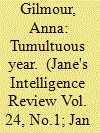

|
|
|
| 20 |
ID:
143585
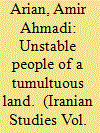

|
|
|
|
|
| Summary/Abstract |
For the English interested in Persia in the nineteenth century, James Morier's Adventures of Hajji Baba of Isfahan was a crucial text, as it also was for Iranians who read its groundbreaking Persian translation almost half a century later. The text provided a persuasive understanding of Persia that has endured in the western imagination. This paper begins with the framing narrative and shows how the frame story sets the stage for a convincing literary portrait of Persia and Persians. Then it analyzes the image of Persia constructed in this book through the characterization of Hajji Baba as representative of Persians, and the geopolitical portrayal of the country that emerges from the account of his travels.
|
|
|
|
|
|
|
|
|
|
|
|
|
|
|
|
|
|
|
|
|